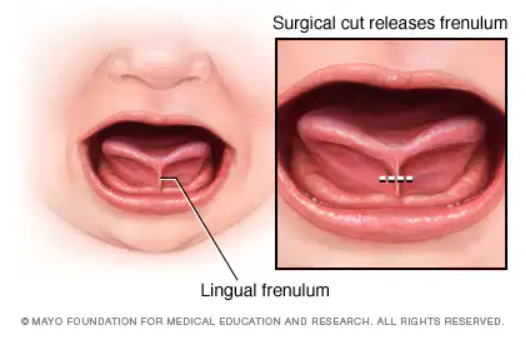Tongue-Tie and Lip-Tie in Babies and Children: Causes, Symptoms, and Treatment
If you’re a parent struggling with breastfeeding challenges or noticing speech difficulties in your child, you may have heard of tongue-tie and lip-tie. These conditions occur when the frenulum, the small band of tissue under the tongue or upper lip, is too tight, restricting movement.
While tongue-tie and lip-tie are common, they often go undiagnosed, leading to feeding difficulties, speech problems, and oral development issues. The good news is that these conditions are easily treatable with a simple and effective procedure called a frenectomy.
At Hansen Dentistry in Apex, NC, we specialize in gentle laser frenectomy treatments to help babies, children, and even adults experience better oral function and improved quality of life. In this guide, we’ll explore the causes, symptoms, treatment options, and long-term benefits of tongue-tie and lip-tie procedures.
What Are Tongue-Tie and Lip-Tie?
Tongue-Tie (Ankyloglossia)
A tongue-tie occurs when the lingual frenulum, the band of tissue under the tongue, is too tight or short, limiting tongue mobility. This restriction can interfere with:
- Breastfeeding and bottle-feeding
- Speech development
- Oral hygiene and swallowing
- Jaw and airway development
Lip-Tie
A lip-tie happens when the labial frenulum, the tissue connecting the upper lip to the gums, is too thick or tight. This can cause:
- Difficulty flanging the lips outward for a proper latch
- Gassiness, reflux, and excessive air swallowing
- Gaps between the front teeth
- Challenges with brushing and flossing
While some babies have both tongue-tie and lip-tie, others may experience only one condition. An evaluation with a trained provider can determine whether treatment is necessary.
Signs and Symptoms of Tongue-Tie and Lip-Tie
Symptoms in Babies:
- Difficulty latching while breastfeeding
- Clicking sounds while nursing or bottle-feeding
- Excessive drooling or choking during feeds
- Poor weight gain despite frequent feeding
- Frustration, fussiness, or colic symptoms
- Gassiness or reflux from swallowing air
- Prolonged or painful breastfeeding sessions
- Nipple pain, cracking, or mastitis in mothers
Symptoms in Toddlers and Children:
- Delayed speech development or difficulty articulating certain sounds
- Trouble swallowing or chewing solid foods
- Persistent drooling
- Dental problems, including a gap between the front teeth
- Increased risk of cavities due to food buildup
- TMJ or oral tension
If you recognize any of these signs, early intervention is key to ensuring proper feeding, speech, and dental development.
How Are Tongue-Tie and Lip-Tie Treated?
The best treatment for tongue-tie and lip-tie is a frenectomy, a quick and minimally invasive procedure that releases the restricted tissue to restore natural movement.
At Hansen Dentistry, we use an advanced laser technique for frenectomies, which offers:
- Minimized discomfort with little to no bleeding
- Faster healing with reduced swelling and infection risk
- Improved latch and feeding for babies
- Better speech and oral development
- Precise and gentle treatment with no need for sutures
The entire procedure takes only a few minutes, and babies typically experience immediate improvement in their ability to feed properly.
Long-Term Benefits of Treating Tongue-Tie and Lip-Tie
Correcting tongue-tie and lip-tie early leads to significant long-term benefits, including:
- Better breastfeeding and nutrition, ensuring that babies receive adequate milk
- Speech and language development with improved articulation
- Improved oral health by reducing the risk of cavities and gum disease
- Healthy jaw and dental alignment by preventing bite issues and airway problems
- Prevention of TMJ and sleep issues by reducing chronic jaw tension and improving airway function
By choosing a safe, effective, and fast laser frenectomy, you’re giving your child the best foundation for a lifetime of better health.
Why Choose Hansen Dentistry for Tongue-Tie and Lip-Tie Treatment in Apex, NC?
At Hansen Dentistry, Dr. Rylan Hansen and our team are committed to helping babies and children thrive with expert, compassionate care. We offer:
- Precise and painless laser treatment with no scalpels or stitches
- Same-day frenectomy appointments with minimal downtime
- Experienced pediatric and family dental care in a kid-friendly environment
- Post-treatment support, including aftercare guidance and follow-up visits
If your baby is struggling with feeding or if you suspect your child has tongue-tie or lip-tie, we are here to help.
Schedule an evaluation today. Call our office or submit our online form to request an appointment to learn more about our laser tongue-tie and lip-tie treatments in Apex, NC.


